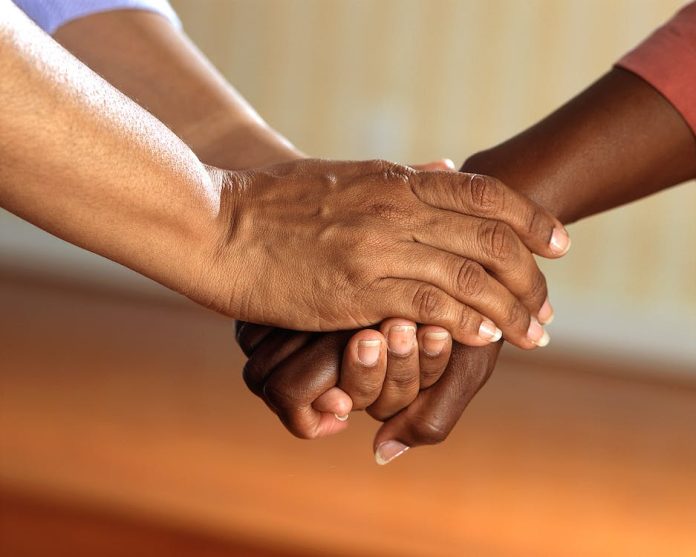
By Ashley Winters, Word in Black
Living In Victory Recovery Sober Living [LIV] is helping those impacted by substance use fight against drug and alcohol addiction at its new rehabilitation facility in the Old North neighborhood.
Owners Derrick and Cameo Jones opened the center in August and say they come from families of addiction. Based on their experiences, they realize many Black families don’t have the resources to help loved one’s fight addiction.
According to the Centers for Disease Control and Prevention (CDC), in 2020, overdose deaths increased by 44% for Black people. Also, the overdose death rate among Black men 65 years and older was nearly seven times that of White males 65 years and older. Black people ages 15 to 24 years old experienced the largest rate increase of 86% compared with changes seen in other age or race groups during 2019–2020.
It is so unfortunate that addicts are treated like criminals instead of sick patients. Especially in the Black community compared to how Black addicts are treated in the judicial system compared to white addicts.
CAMEO JONES, CO-OWNER OF LIV CENTER
The report also pointed out that in counties with a higher income wage gap there were greater disparities in overdose deaths, especially among Black people. The rate is more than two times as high in areas with more income inequality versus those with less income inequality.
“Our Black men are literally an endangered species,” said Cameo Jones. Derrick follows up saying their facility in Old North is needed to help more young men, especially young Black men.
The Jones’ first facility opened in St. Charles in 2018. They learned that many Black people didn’t have transportation to reach them, and many people did not want to be served in a predominantly white area.
“Our goal became to work our way back down to the city to provide the same resources as they receive at our St. Charles location,” said Derrick.
According to Cameo, when it comes to people of color who face substance use, there are so many hurdles to receiving proper treatment. Cultural hurdles, mental health hurdles, awareness, and transportation. She said, “Our people didn’t even know we [LIV] existed.”
The 35-bed, three-story rehab center offers room and board, food, a 12-step program, onsite therapy, and a new approach to treating substance use. It is currently full of clients.
They change the way people discuss addiction, using the term substance abuse in conversations.
Instead of using the more common term substance abuse, the Joneses use substance use. The goal is taking prolonged shame out of being an addict.
“It is so unfortunate that addicts are treated like criminals instead of sick patients. Especially in the Black community compared to how Black addicts are treated in the judicial system compared to white addicts,” Cameo said.
The Drug Policy Alliance report shows Black people use drugs at similar rates to people of other races. But Black people comprise 30% of those arrested for drug law violations and nearly 40% of those incarcerated in state or federal prison for drug law violations. Mandatory minimum sentencing laws contributed greatly to the number of people of color behind bars.
LIV doesn’t just talk about the addiction, but we cover the mind, the trauma where the addiction came from. We have to get to the exact nature of what’s going on.
CAMEO JONES, CO-OWNER OF LIV CENTER
LIV has a pilot program called Respite, which is designed for addicts known as ‘tweeners.’ They have gone through recovery programs, are ready to re-enter society, but still need some type of structure of a rehab center.
During the 90-day program, they must find employment, get a sponsor, and they also have a support group onsite at LIV. Monthly community service is mandatory, and LIV supports their room and board and aids them with their meals.
“They are doing the work to re-integrate themselves in the community, with our support and guidance,” said Cameo. “Respite is the bridge to everything, be it the treatment, recovery housing, outpatient services, or permanent housing. LIV doesn’t just talk about the addiction, but we cover the mind, the trauma where the addiction came from. We have to get to the exact nature of what’s going on.”
Jack Douglas, a returning patient of LIV, says he doesn’t know where he would be without it.
“They saved my life,” said Douglas.
Elizabeth Kowalik, LIV’s onsite therapist, says many clients suffer from “not truly knowing who they are as an individual.”
“I feel Black men are plighted by that more so than other populations because they are prone to systemic stuck points,” she said.
LIV provides room and board, meals, 24-hour services, treatment, transportation, therapy, and medication treatment. The owners hope to start a Respite program for women at their new location too.



